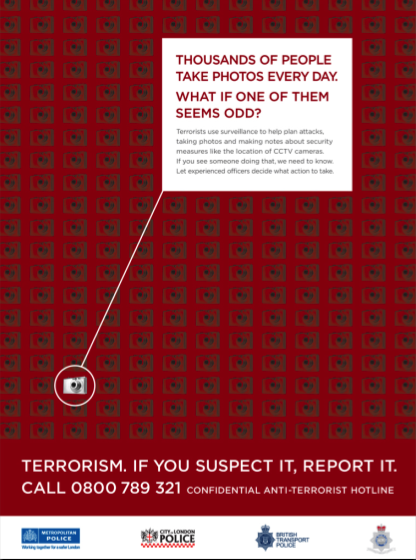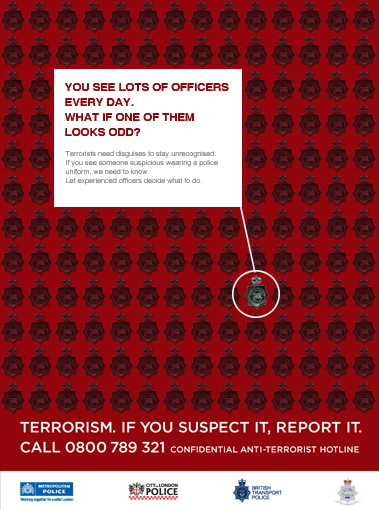We are developing the social individualist meta-context for the future. From the very serious to the extremely frivolous... lets see what is on the mind of the Samizdata people.
Samizdata, derived from Samizdat /n. - a system of clandestine publication of banned literature in the USSR [Russ.,= self-publishing house]
|
All the London newspapers today are full of a new but familiar “report on strange people to the wonderful and efficient experts in the police” anti-terrorism advertisement.
I am a foreigner. I have five mobile phones. Readers are invited to speculate as to why this is (although it could just be that “I need communication”, or perhaps that I find that sitting in a bar sending text messages to myself relieves the monotony of life). I swap their SIMs around all the time, often in public places and for sinister reasons like “The battery ran out on my main phone and I still want to receive calls on that number”..
Also, I like to wander around London and other cities photographing things like bridges, container ports and other critical infrastructure.
When am I going to be reported? Will I be sent to Guantanamo? Will Brian be there too? Why the fuck are these people wasting my taxes like this?
Also, where did the “thousands” come from? If we are talking the whole world, it would be “billions”. If we are talking the UK it would be “tens of millions”. Statistics actually suggest that there are around seventy million active mobile phones in the UK. Given that that is ten million more than there are people in the national population, and given that there must be at least ten million people who realistically are too young to have one, there are at least twenty million suspicious phones in the UK.
Who knew the terrorism problem was this big?
I have just received my new passport. I am not British, and I will be deliberately vague about the country that issued it. The fee for getting it renewed was significantly higher than last time. I do like the nice touch of requiring me to pay a “priority fee” for getting the new passport in a reasonable time. The idea that we should help our citizens by being prompt and efficient in the first place is gone completely.
Upon receiving the passport, I perhaps discovered the reason for the higher fee. The passport has a little logo of a chip on the front cover and on the details page. There is an insert stating that “This is an ePassport. This passport contains a microchip which stores the same information that as appears on the data age. The chip can be read electronically to confirm the identity of the bearer. This document complies with International Civil Aviation Organisation standards and incorporates security features to prevent illegal access to the information stored on the chip. See the centre page of the passport for further information”.
My country is the sort of place that tends to be proud of being first on the block with respect to implementing fancy new international protocols, so I suppose this does not greatly surprise me. If the chip only contains the same data as the details page, then I rather fail to see the point, given that the passport is machine readable already. If the intention is to add more data to such chips later, I am not sure that the present “This is just a new way of storing the same data” claims are entirely honest. Storing digitally signed data on the chip probably does make sense and genuinely does make such a passport harder to forge. So I will concede that point.
Still, making it possible to read the passport without requiring it to be opened seems to me to rather reduce my security rather than increase it. As for the security features to prevent illegal access, surely for technology to be useful it must be made possible for every border post in every country in the world to be able to obtain equipment for reading it. Even if I made the ludicrous assumption that I trust every government in the world, I still find it hard to believe that such a widely distributed technology would not fall into private hands.
So, where from here. Well, as it happens I can turn to the centre page of the passport. This page is stiffer than the others, presumably due to having a chip embedded in it. It also has information written on it. “This passport contains sensitive electronics. For best performance, please do not bend, perforate, or expose to extreme temperatures or excess moisture”.
So, which of those things should I try first?
Even the most hard-bitten student activist would recognise its not an abrogation of his radicalism to get an ID card if it helps him to provide an assurance of his identity to those who provide services to him.
– Ms Home Secretary Jacqui Smith (quoted in Computer Weekly) reacting to criticism by the National Union of Students of plans to hustle and hassle students to register themselves for life on the great and glorious National Identity Register. It is just extraordinary how tone deaf to human life, how uncomprehending of the impulses to privacy and personal liberty, this strange class of apparatchiks is. Jacqui Smith’s own concept of radical activism may not extend very far. A friend who was her contemporary at Hertford College commented:
Yes, I remember Jacqui Smith from college but only vaguely. She was a fairly inoffensive JCR/political hack… you know… terribly earnest. I think she may have been president of the JCR at some point.
It seems she has grown, changed, and reinvented herself – as a monstrously offensive political hack.
For me the idea of the state installing cameras everywhere to ensure compliance with its edicts was the most memorable aspect to George Orwell’s dystopian 1984, with Newspeak a close second. But of course here in the real world, the state would never try to force private business owners to allow the state to place cameras to make sure people are following regulations, right?
Wrong.
Cameras could be placed in about 800 U.S. slaughterhouses to watch for improper procedures and inhumane handling of cattle, a federal official said Thursday. A Senate committee recommended installing the cameras three years ago, but the proposal is getting new consideration in the wake of a massive recall of beef last month, Agriculture Undersecretary Richard Raymond told a House committee Thursday.
And what comes next? Cameras in schools and daycare centres naturally. For the children of course. And after that? I mean, why stop there?
Last week the Metropolitan police spent shed loads of taxpayers money on pointless advertising launched a new counter-terrorism campaign.
Londoners are being urged to help stop terrorists in their tracks by reporting suspicious behaviour, in a new counter terrorism advertising campaign.
The Metropolitan Police Service is asking people to trust their instincts and pass on information about any unusual activity or behaviour to the confidential Anti-Terrorist Hotline on 0800 789 321.
And now for the visuals:

When I saw those for the first time, I honestly thought these were a joke. And lo and behold, it did not take long for them to become just that…

And of course the Lolcats version:

Long live the internetz.
Suppose that Her Majesty’s Revenue and Customs have lost your personal financial information (along with that of 25 million other people) on a set of lost CDs, or perhaps they have simply lost all the details of your VAT registration.
In any event, the criminals have your National Insurance number. You are worried about fraud. It is good that HMRC have provided information to help you deal with it.
(Via the Register).
You should see an ID card like a passport in-country.
– Meg Hillier MP, the minister responsible for the scheme, to the House of Commons Home Affairs Committee, today.
And it is The Economist. Unlike some of my fellow Samizdatistas, I am a fan [1]. But then, I am a liberal – conservative only in my suspicion of social management and ‘fixing’ things without enquiry as to whether they are actually broken.
This week in the print edition there is an excellent supplement: The electronic bureaucrat (introduction here). It is clear-sightedly critical of e-government of all kinds, without falling into the know-nothing technophobic rants that I fear some of those who oppose the database state do:
[G]loom, fear and optimism are all justified.
[1] Though I sincerely hope putting Martin Sheen on the cover of the Intelligent Life quarterly was one of its deadpan jokes.
Late last year, HM Revenue & Customs succeeded in losing details on 25m Britons. That was quite an impressive achievement; the loss of data on disks, unencrypted, had an almost artistic quality about it. It was glorious to watch BBC rottweiller Jeremy Paxman reduce some hapless junior Treasury minister to dogfood on the BBC Newsnight programme. (The Chancellor, Alisdair Darling, was too busy dealing with the disaster of Northern Rock to go on the show). As Paxman argued by way of a statement more than a question to the hapless government minister (I forget her name, she is totally forgettable): “This does rather kill off the idea of ID cards, doesn’t it?”
It certainly does. And alas, my wife this morning received a letter from HMRC to inform her that details she sent to it in relation to her business (I will not give any further details for obvious reasons), have all been lost: date of birth, registration numbers for VAT, the whole shebang. The letter informed us of the need to be super-vigilant about bills, invoices etc. We will have to use services like Equifax or Experian, the credit-check companies, to ensure that our credit history is not damaged. All a great nuisance. I am also writing to my local member of Parliament, Mark Field (Conservative), who voted against ID cards to his immense credit, to inform of this latest case. About 40 or so forms, according to the letter sent to us, have been lost in this latest HMRC cockup. I will ask Field to raise this matter as part of the Tories’ opposition to ID cards. There is, of course, no point informing anyone on the government side about this.
Or is it a cock-up? I wonder about what is happening at the moment. If you are a conspiracy theorist, you might start to wonder whether there are criminals working in civil service jobs or major banks – which increasingly operate like state departments due to the amount of regulations these days. The recent massive fraud that hit Societe Generale, the French bank, was, remember, carried out by at least one, if not more, insiders who had knowledge of how the compliance operations of these complex organisation work. Or, it is possible that someone in HMRC has an agenda against ID cards and is using incidents like this to discredit the whole project.
Anyway, whatever your views about ID cards and government use of data, I strongly urge people to use credit-check and verification services at least once a year to ensure they have a clean bill of health. In the current difficult credit market environment since the US sub-prime mortgage disaster, even the smallest blemish on a credit record could cause an individual serious problems, such as inability to get a loan.
Bastards.
I write a lot of letters to the press. They are usually edited for length by the letters pages subs, and often improved thereby. If you can say something shorter it is usually better. However, occasionally it goes wrong. This week the London Evening Standard mangled something I wrote so badly as to remove most of the point.
The original may not be the most eloquent piece, but it should be published somewhere. I have added a few links to give blogospheric readers the context:
Sirs,
A man is held without charge at the instance of a foreign power and a visit from his MP is secretly recorded on the instructions of police acting without a warrant. A decade ago this would have been Britain only in a science-fictional parallel-world. David Davis is quite right (Article, 5 February) to condemn it. But things are still getting worse. Surveillance powers – most of which date from 2000, before the “War on Terror” was declared – are old hat.
The Government obsession now is “information sharing”, connecting the numerous databases now kept on us by various departments. This “Transformational Government” multiplies the attack on privacy and liberty many-fold. Its shadow falls on almost all new legislation. The Counter-Terrorism Bill currently before parliament, for example, would allow information to be disclosed to and passed on by the Intelligence Services, regardless of how it is obtained and despite confidentiality or privilege. Meanwhile the Ministry of Justice has been given a programme to weaken in general the existing controls on information in government hands, and the National Identity Management Scheme (ID cards), the means to join it all up, is being pressed forwards on a new schedule.
We are facing not just a surveillance state, but the building of a new phenomenon, the database state.
Yours faithfully
Guy Herbert
General Secretary, NO2ID
Anyone worried by Natalie’s posting below should be aware that you ain’t seen nuttin’ yet. Tom Griffin of The Green Ribbon has obtained a full listing of the information it is intended to collect (and distribute among various authorities) concerning those buying tickets to move from any one of Britain, the Irish Republic, and Northern Ireland to any of the others.
There has been a common travel area since St Patrick, and this was formalised in the 20th century when the countries of Britain and Ireland came incompletely apart. Now it seems both governments are in effect conspiring to introduce internal passports and replace a common travel area with a common surveillance area.
[hat-tip: spyblog]
The writer of this Times story: Pensioner died in attack on his home after parking space row, has, perhaps understandably, concentrated on what exactly Mark, Zoe and Steven Forbes did to the late Bernard Gilbert and whether “We’ll smash his car to bits and then his hire car and then whatever he gets after that until he dies” constituted a considered plan.
However that may be, there is an aspect of the story that deserves a story – and a trial – of its own:
Mrs Forbes was upset and called her husband Mark, who told her to note down Mr Gilbert’s numberplate. He then asked a policeman friend to check Mr Gilbert’s address on the police national computer, using the car registration number.
The innocent have nothing to fear – so long as they have not annoyed anyone who knows a copper who can be persuaded to look up an address.
|
Who Are We? The Samizdata people are a bunch of sinister and heavily armed globalist illuminati who seek to infect the entire world with the values of personal liberty and several property. Amongst our many crimes is a sense of humour and the intermittent use of British spelling.
We are also a varied group made up of social individualists, classical liberals, whigs, libertarians, extropians, futurists, ‘Porcupines’, Karl Popper fetishists, recovering neo-conservatives, crazed Ayn Rand worshipers, over-caffeinated Virginia Postrel devotees, witty Frédéric Bastiat wannabes, cypherpunks, minarchists, kritarchists and wild-eyed anarcho-capitalists from Britain, North America, Australia and Europe.
|






